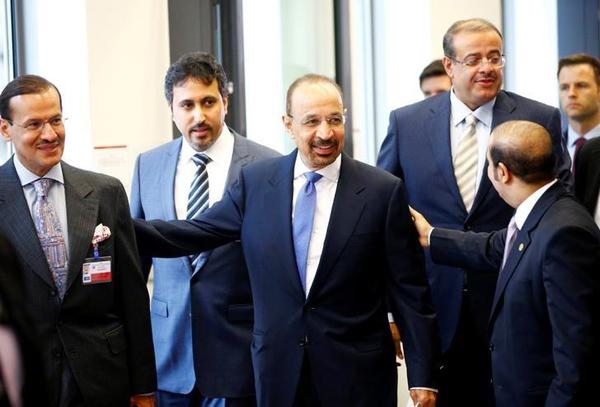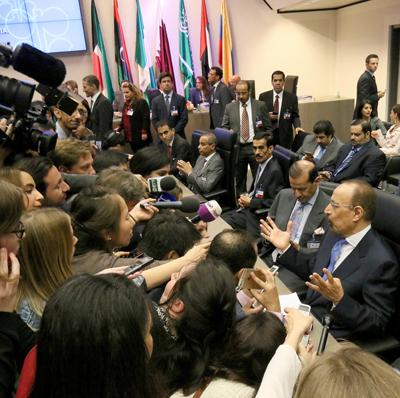You are here
Iran offers no action in support of global oil pact
By Reuters - Feb 17,2016 - Last updated at Feb 17,2016

A worker checks an oil pipe at an oil field in Russia in this file photo. Iran is showing no support for a global deal to restrain oil production to prop up prices (Reuters photo)
ANKARA/DUBAI — Iran on Wednesday stopped short of offering to restrain oil output as part of a global pact to freeze production to prop up prices, making clear it wants to recapture the market share it lost during years of sanctions.
Iran's stance will complicate talks on output levels after a surprise compromise this week between two of the world's top exporters, Russia and the group's leader Saudi Arabia, to freeze output at January levels, near their historic highs.
The first mooted global oil pact in 15 years has so far failed to impress the market, which had expected a production cut instead of a freeze that could even turn into an increase if Iran wins special terms from fellow members of the Organisation of Petroleum Exporting Countries (OPEC).
"This is the first step and other steps should also be taken. This cooperation between OPEC and non-OPEC members to stabalise the market is good news. We support any effort to stabilise the market and prices," Iranian Oil Minister Bijan Zanganeh said, according to the Shana news agency.
Zanganeh spent around two hours with oil ministers from Iraq, Qatar and Venezuela in Tehran on Wednesday. The visitors, who flew from Doha, where the output deal was clinched on Tuesday, left the Tehran meeting without comment.
Zanganeh spoke to Iranian media afterwards and chose his words carefully to avoid mentioning Iran's position on freezing its own output.
"We had a good meeting today and the report of yesterday's meeting was given to us. We support cooperation between OPEC and non-OPEC members," he said.
"I was told that Russia as the world's biggest oil producer, Oman and other countries are ready to join. This is a positive step, we have a positive approach to it, this is a good start," the minister added.
Illogical demands
OPEC Gulf producers Qatar, Kuwait and the United Arab Emirates, as well as Venezuela said they would join the Russian-Saudi pact, aimed at tackling a growing oversupply and helping prices recover from their lowest in over a decade.
But Iran is the major obstacle to the first joint OPEC and non-OPEC deal since 2001, having pledged to increase output sharply to regain market share lost during sanctions.
"Asking Iran to freeze its oil production level is illogical... when Iran was under sanctions, some countries raised their output and they caused the drop in oil prices," Iran's OPEC envoy, Mehdi Asali, told the Shargh daily newspaper before the talks on Wednesday.
The sanctions, imposed over Iran's nuclear programme, were lifted last month after an agreement with world powers, allowing Tehran to resume selling oil freely in international markets.
Iran exported around 2.5 million barrels per day (bpd) of crude before 2012, but sanctions cut that to around 1.1 million bpd.
Tehran has pledged to raise supply by around 1 million bpd in the next 6-12 months and on Wednesday some Iranian banks were reconnected to the SWIFT global transaction network, which will allow it to facilitate banking business.
Special terms
Iranian barrels would only add to the global glut, which has been fuelled by US shale output and a decision by Saudi Arabia to pump at full capacity to drive higher-cost producers out of business.
The world is already producing more than 1 million bpd than it consumes, with oil stockpiles at record levels. OPEC member Libya, whose output was cut to a fraction by a civil war, said on Wednesday it was keen to produce more.
Oil prices fell below $30 per barrel in January from as high as $115 in mid-2014, hammering the finances of Russia, Saudi Arabia and other producers.
Brent oil futures rose almost 7 per cent on Wednesday after losing 4 per cent the day before to trade near $35 per barrel.
Related Articles
DUBAI/LONDON — A second oil price rout of 2015 has forced Arab members of the Organisation of Petroleum Exporting Countries (OPEC) to cut th
DUBAI/LONDON — OPEC will probably revive talks on freezing oil output levels when it meets non-OPEC nations next month as top exporter Saudi
VIENNA – Saudi Arabia promised on Thursday not to flood the oil market with extra barrels even as OPEC failed to agree on output policy, wit
















